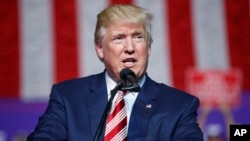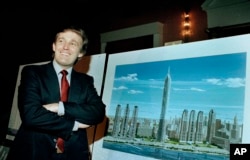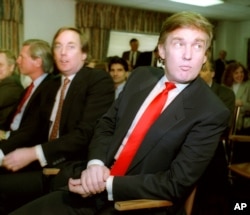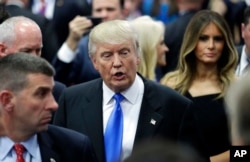Across the country, Donald Trump’s most ardent supporters have a few go-to lines to explain why he’s their choice for president:
“He tells it like it is.”
“He knows how to run a business.”
And a fan favorite: “He wants to make America great again.”
In the U.S. general election, these might work as slogans, but they say nothing about how Trump would make the nation great or why a background running a real estate business is an asset.
Edward Mermelstein, a New York-based real estate lawyer who has done business with Trump over the last 20 years, thinks he knows. He considers the Republican nominee “aggressive,” which he admires. During an interview with VOA, he used the word six times to describe Trump, his choice for president.
“He tends to work within a high pressure atmosphere, and as a result, he’s developed a fairly thick skin and a very aggressive skin,” Mermelstein argued. “He has a very nontraditional way of dealing within the political circles, and I think that’s why there’s such a strong response to what he says and what he does on the political trail.”
Trump's early years
From the beginning, Trump’s style of conducting business has been no stranger to controversy or brashness.
In 1973, his father’s company, Trump Managment Inc., was charged with race discrimination in its renting practices, a violation of the Fair Housing Act of 1968. It was one of the biggest housing discrimination cases of the era.
But Trump, who was just 27 and the new company president, waded right in with what would become known as his signature cocky style. At a news conference in a Manhattan hotel, he called the government’s case “outrageous lies.”
He and his father retained lawyer Roy Cohn — the same chief counsel hired by Senator Joseph McCarthy during the 1950s “Red Scare” persecution of suspected communists, which is often characterized as a witch hunt.
Cohn portrayed the Trumps as victims and counter-sued the government for $100 million in damages.
Mermelstein says New York real estate does not allow for weak personalities — a reality, he argues, that might explain why Trump has made some enemies along the way.
“Being so aggressive in his negotiations and being aggressive in the way he conducts business gets him the best deals, but it doesn’t necessarily get him friends,” Mermelstein said.
Trail of ‘wreckage’
Beth Rosser is not a Trump friend.
Based in West Chester, Pennsylvania, Rosser is part owner of Triad Building Specialties, a company that was hired by a general contractor to install toilet partitions at Trump Taj Mahal Casino Resort in 1990.
At the time, the contract was Triad’s largest, valued at approximately $230,000 . But what followed was a bankruptcy — one of Trump’s four Chapter 11 filings — and two years of litigation. Triad was eventually paid, but just 30 cents on the dollar.
According to the Associated Press, after the casino opened in April 1990, Trump still owed $70 million to 253 building contractors.
Rosser, who describes Trump as a “blowhard,” says there is a big difference between being aggressive and taking advantage of people.
“Trump made lots of money in Atlantic City,” Rosser told VOA. “He ruined a lot of people as well.”
“Even in his darkest chapters, [Trump] tends to find a way where he comes out ahead financially, no matter what wreckage he leaves behind,” confirmed Washington Post senior editor Marc Fisher. “There’s a long trail of vendors, contractors, shareholders who lost their shirts because they got in bed with Donald Trump. He has no remorse for that.”
Trump is currently engaged in lawsuits involving several of his businesses, including Trump University and the Trump International Hotel in Washington D.C. Most recently, questions have been raised about Trump's non-profit, charitable organization, the Trump Foundation.
CEO to commander-in-chief?
Since Donald Trump has never held public office, voters are faced with the extraordinary task of speculating how the real estate magnate might actually govern, if elected.
Fisher and investigative political reporter Michael Kranish looked for clues in his upbringing and early rise to financial prowess in their new book, “Trump Revealed: An American Journey of Ambition, Ego, Money and Power,” which drew on more than 20 hours of interviews with the Republican nominee. The co-authors reached a conclusion: Trump is “hugely confident in his abilities, not terribly well informed, quick to take offense.”
Kranish says Trump’s greatest takeaway from his business failures — including the Taj Mahal Casino Resort bankruptcy — was that taking on too much debt posed a greater personal benefit than risk.
“What he eventually learned was that he could make a lot of money not by risking his own capital but by having other people risk their capital for him,” said Kranish. “He made money from licensing his name. Other people made money or lost money by putting their own capital up for those buildings. So, in a way, he couldn't lose.”
Fisher added that some business partners like Mermelstein, who have done extensive development and property deals with Trump, continue to stand by him because they see him as “a great actor who thinks big and gets things done.”
Ten times harder
For better or worse, Kranish and Fisher conclude that Trump is self-assured in his abilities and political aspirations not out of faith in his ideology, but because of his experience of handling Trump business — through all its highs and lows.
“Throughout his career, [Trump] has nearly hit rock bottom on this roller coaster ride, but he has managed to come up through various means,” Kranish said. “People would underestimate him at their own peril.”
It goes back to that decision to counter-sue the government in response to the 1973 housing discrimination case, that early defining moment when Trump was introduced to the public eye.
“Roy Cohn told him you need to fight the government, fight like hell, and that's what Trump decided to do,” Kranish said. “Trump was told by Cohn, ‘When they hit you, hit back 10 times harder.’”







